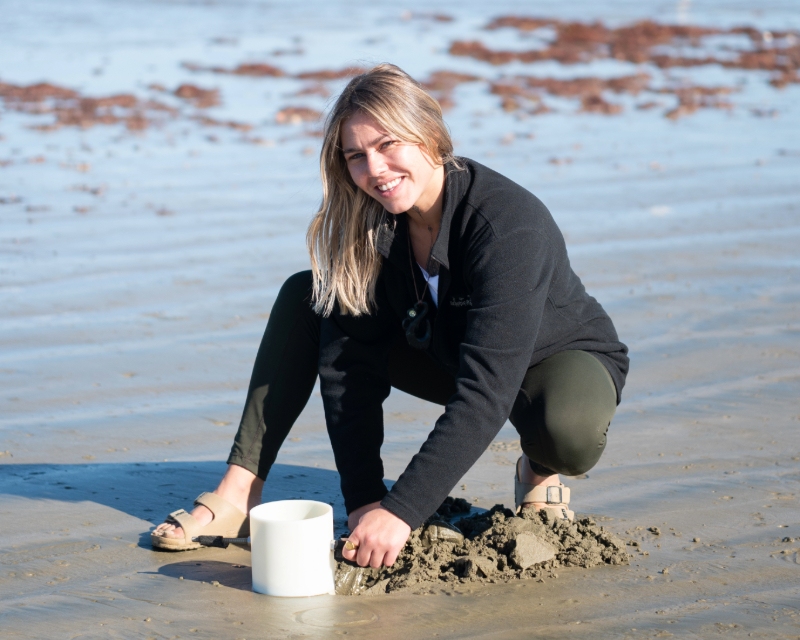The privilege and responsibility of being a guardian

Renee Bull’s strong connection with the sea has been instilled in her since she was very young and she credits much of that to her Pōua (Grandfather) Ronnie Bull and Dad, Rewi Bull.
While Renee grew up in Invercargill, her family marae, Te Akau at Colac Bay, forms a cornerstone of her connection with her whānau, iwi (tribe) and Southland’s wider environment.
Now with a small family of her own and in her first year working at Te Ao Mārama as a Kaitohutohu Taiao (Māori environmental advisor), she’s recognising that what she thought was a fairly typical upbringing, really wasn’t.
From spending a month or more on the Tītī Muttonbird Islands with her Pōua and cousins every year, to leaving school at 15 and joining her Dad in the family fishing business working all areas of the Fiordland coastline, Renee’s connection with the moana (sea) is something she now describes as a privilege.
“I never really thought about it because it was just normal,” she says.
“It’s taken working at Te Ao Mārama to really open my eyes, and working with other people from the area; other extended whānau and realising we didn’t all have that.”
“I see it as a privilege. Knowing that and having these experiences, they come with responsibilities of kaitiakitanga (guardianship).”
“It could be seen as a burden. Sometimes I think I’d love to step back and spend more time with my kids, but who am I to take that privilege, turn my back on this mahi, and not give back to our whenua (land), our taiao (environment).”
Renee’s education was more mainstream than her parents and grandparents had been, but the education she’s received from spending time with her parents and grandparents on the land and out at sea has shaped her world view and how she applies that today.
She tells the story of her Pōua planting different species of trees and shrubs from the Tītī Islands at Colac Bay.
“He planted all along the coastline, but some of them disrupted the views of the sea so he was asked to remove them.
He kept them on our land though, and they’re still thriving and protecting that land from erosion.”
“There’s always going to be battles between Tāne-mahuta and Tangaroa – and this causes the erosion. They’re fighting constantly.”
She uses stories like these to explain her perspective, drawing on this mātauranga (traditional knowledge) that’s been passed down to her to understand what the environment needs.
“I use this because I see the value in the old tikanga and the old mātauranga and the knowledge that our elders held. It’s not about what I know, it’s about what has been passed down.”

Renee’s work and personal life combine when it comes to her connection to the coast. Living at Green Point with her family, across from the harbour, she’s a regular when it comes to gathering kaimoana (seafood).
But it’s not as accessible as it once was. She’s working to pass on her knowledge to her children, who attend kōhanga reo and kura kaupapa here in Murihiku Southland.
“Language is an important aspect of understanding how our tūpuna (ancestors) used to think.” And it’s now their turn to head down to the Tītī Islands with their grandparents.
“Ko au te whenua, ko te whenua ko au – I am the land and the land is me."
It’s not just a nice saying, it really does mean that,” Renee says.
“I can’t be healthy if the place I’m living in isn’t, and that’s including the awa and the moana.”
“If it’s not healthy, I’m not going to be either. If I’m gathering from there, if I’m bathing in there, if I’m sending my kids down there.”
In the year she’s been with Te Ao Marama, she’s had a steep learning curve supporting the small team with consent processing, cultural impact assessments and supporting farmers with advice on environmental actions.
She’s been out on farm offering her perspective.
“I really enjoy that side of the role. One hundred per cent of the people I’ve met want to do the right thing.
And all they want is the knowledge to know how. It’s about collaboration.”


